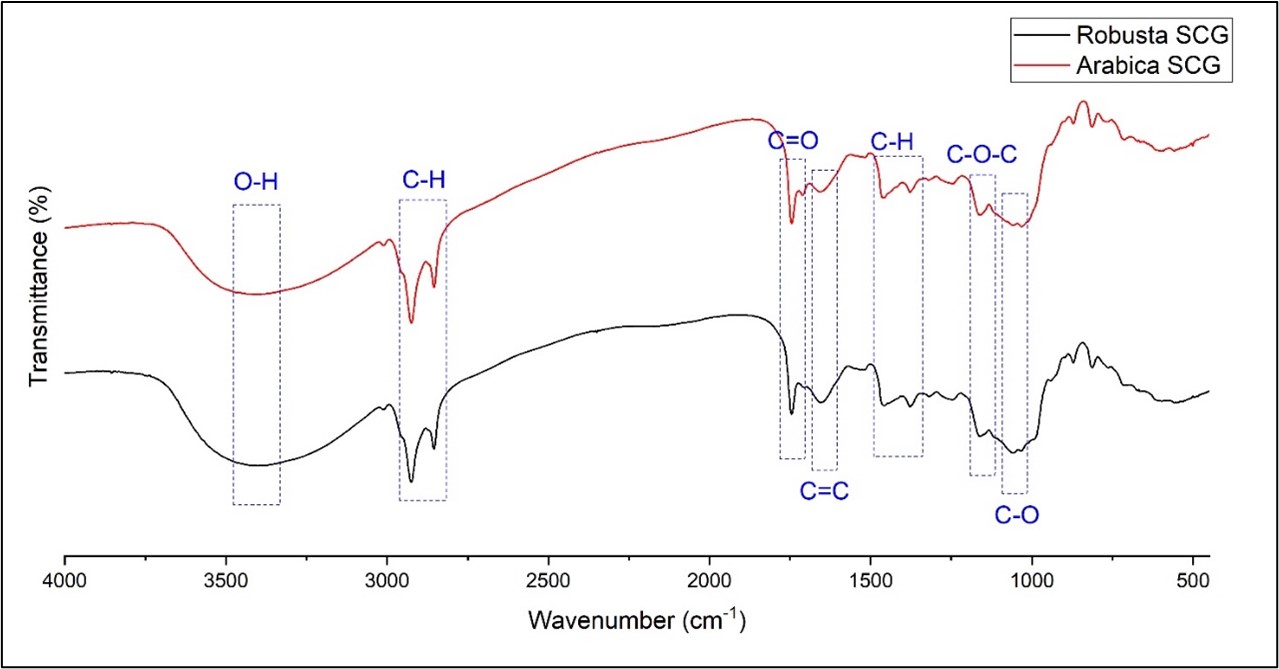Morphological structure and functional group of Toraja robusta and arabica spent coffee grounds for electronic device applications
DOI:
https://doi.org/10.12928/jrkpf.v10i1.378Keywords:
spent coffee grounds, Robusta, Arabica, electronics deviceAbstract
Spent coffee grounds (SCG) are waste byproducts of the coffee brewing process and are frequently disposed of in landfills, which raises environmental issues. A thorough overview of the properties of coffee grounds has yet to accompany the utilization of coffee grounds in many applications. This study attempts to categorize different coffee grounds based on their morphological structure and composition/element characteristics using scanning electron microscopy (SEM) for microstructural analysis and Fourier transform infrared spectroscopy (FTIR) to figure out the functional groups in coffee grounds. Morphological structure analysis showed that Robusta and Arabica SCG were dominated by around 70% of carbon, oxygen, and nitrogen. FTIR analysis revealed seven different peaks in Robusta and Arabica coffee grounds. Finally, the high concentration of carbon in Robusta and Arabica coffee grounds led to promising electrochemical energy storage for electronics applications.
References
M. Ding et al., "Association of coffee consumption with total and cause-specific mortality in 3 large prospective cohorts," Circulation, vol. 132, no. 24, pp. 2305-2315, 2015, doi: 10.1161/CIRCULATIONAHA.115.017341. https://doi.org/10.1161/CIRCULATIONAHA.115.017341
D. Peshev, D. Mitev, L. Peeva, and G. Peev, "Valorization of spent coffee grounds - A new approach," Sep. Purif. Technol., vol. 192, pp. 271-277, 2018, doi: 10.1016/j.seppur.2017.10.021. https://doi.org/10.1016/j.seppur.2017.10.021
International Coffee Organization (ICO), "Coffee Market Report." 2023.
C. Kourmentza, C. N. Economou, P. Tsafrakidou, and M. Kornaros, "Spent coffee grounds make much more than waste: Exploring recent advances and future exploitation strategies for the valorization of an emerging food waste stream," J. Clean. Prod., vol. 172, pp. 980-992, 2018, doi: 10.1016/j.jclepro.2017.10.088. https://doi.org/10.1016/j.jclepro.2017.10.088
A. S. Fernandes et al., "Impacts of discarded coffee waste on human and environmental health," Ecotoxicol. Environ. Saf., vol. 141, pp. 30-36, 2017, doi: 10.1016/j.ecoenv.2017.03.011. https://doi.org/10.1016/j.ecoenv.2017.03.011
X. C. Schmidt Rivera, A. Gallego-Schmid, V. Najdanovic-Visak, and A. Azapagic, "Life cycle environmental sustainability of valorisation routes for spent coffee grounds: From waste to resources," Resour. Conserv. Recycl., vol. 157, no. September 2019, p. 104751, 2020, doi: 10.1016/j.resconrec.2020.104751. https://doi.org/10.1016/j.resconrec.2020.104751
X. Hu, H. Huang, Y. Hu, X. Lu, and Y. Qin, "Novel bio-based composite phase change materials with reduced graphene oxide-functionalized spent coffee grounds for efficient solar-to-thermal energy storage," Sol. Energy Mater. Sol. Cells, vol. 219, no. September 2020, p. 110790, 2021, doi: 10.1016/j.solmat.2020.110790. https://doi.org/10.1016/j.solmat.2020.110790
I. Efthymiopoulos, P. Hellier, N. Ladommatos, A. Kay, and B. Mills-Lamptey, "Effect of Solvent Extraction Parameters on the Recovery of Oil From Spent Coffee Grounds for Biofuel Production," Waste and Biomass Valorization, vol. 10, no. 2, pp. 253-264, 2019, doi: 10.1007/s12649-017-0061-4. https://doi.org/10.1007/s12649-017-0061-4
P. Jin Ong et al., "Valorization of Spent coffee Grounds: A sustainable resource for Bio-based phase change materials for thermal energy storage," Waste Manag., vol. 157, no. December 2022, pp. 339-347, 2023, doi: 10.1016/j.wasman.2022.12.039. https://doi.org/10.1016/j.wasman.2022.12.039
F. Luna-Lama et al., "Non-porous carbonaceous materials derived from coffee waste grounds as highly sustainable anodes for lithium-ion batteries," J. Clean. Prod., vol. 207, pp. 411-417, 2019, doi: 10.1016/j.jclepro.2018.10.024. https://doi.org/10.1016/j.jclepro.2018.10.024
A. M. Ali et al., "Synergistic evaluation of co-torrefaction performance of rice husk and coffee bean ground blends for biosolid production for industrial fuel sustainability," Fuel, vol. 343, no. February, p. 127891, 2023, doi: 10.1016/j.fuel.2023.127891. https://doi.org/10.1016/j.fuel.2023.127891
L. Blinová, A. Pastierova, and M. Sirotiak, "Biodiesel Production from Spent Coffee Grounds," Res. Pap. Fac. Mater. Sci. Technol. Slovak Univ. Technol., vol. 25, no. 40, pp. 113-121, Jun. 2017, doi: 10.1515/rput-2017-0013. https://doi.org/10.1515/rput-2017-0013
I. Pawarangan and W. Jefriyanto, "Identification of Electrical Properties of Bio-battery based on Spent Coffee Grounds," Bul. Fis. Vol 23 No 2 Bul. Fis., Aug. 2021. https://doi.org/10.24843/BF.2022.v23.i02.p03
I. Pawarangan, M. Pineng, and S. A. Anum, "The electrical productivity of Arabica coffee grounds battery based on electrode distance and dryness level," J. Ris. dan Kaji. Pendidik. Fis., vol. 9, no. 1, pp. 1-8, 2022, doi: 10.12928/jrkpf.v9i1.20. https://doi.org/10.12928/jrkpf.v9i1.20
M. Jiang et al., "Upcycling plastic waste to carbon materials for electrochemical energy storage and conversion," Chem. Eng. J., vol. 461, no. November 2022, p. 141962, 2023, doi: 10.1016/j.cej.2023.141962. https://doi.org/10.1016/j.cej.2023.141962
Z. Zhai et al., "A review of carbon materials for supercapacitors," Mater. Des., vol. 221, p. 111017, 2022, doi: 10.1016/j.matdes.2022.111017. https://doi.org/10.1016/j.matdes.2022.111017
V. Bejenari et al., "Physicochemical characterization and energy recovery of spent coffee grounds," J. Mater. Res. Technol., vol. 15, pp. 4437-4451, 2021, doi: 10.1016/j.jmrt.2021.10.064. https://doi.org/10.1016/j.jmrt.2021.10.064
M. Bekirogullari, "Hydrogen production from sodium borohydride by ZnCl2 treated defatted spent coffee ground catalyst," Int. J. Hydrogen Energy, vol. 45, no. 16, pp. 9733-9743, 2020, doi: 10.1016/j.ijhydene.2020.01.244. https://doi.org/10.1016/j.ijhydene.2020.01.244
J. Chwastowski, D. Bradło, and W. Żukowski, "Adsorption of cadmium, manganese and lead ions from aqueous solutions using spent coffee grounds and biochar produced by its pyrolysis in the fluidized bed reactor," Materials (Basel)., vol. 13, no. 12, pp. 1-14, 2020, doi: 10.3390/ma13122782. https://doi.org/10.3390/ma13122782
A. M. Girelli, V. Chiappini, and P. Amadoro, "Immobilization of lipase on spent coffee grounds by physical and covalent methods: A comparison study," Biochem. Eng. J., vol. 192, no. January, p. 108827, 2023, doi: 10.1016/j.bej.2023.108827. https://doi.org/10.1016/j.bej.2023.108827
C. Y. Chen, W. H. Chen, S. Lim, H. C. Ong, and A. T. Ubando, "Synergistic interaction and biochar improvement over co-torrefaction of intermediate waste epoxy resins and fir," Environ. Technol. Innov., vol. 21, p. 101218, 2021, doi: 10.1016/j.eti.2020.101218. https://doi.org/10.1016/j.eti.2020.101218
G. Semaan, M. R. Atelge, R. Dune Cayetano, G. Kumar, and R. Kommedal, "Spent coffee grounds anaerobic digestion: Investigating substrate to inoculum ratio and dilute acid thermal pretreatment," Fuel, vol. 331, no. P1, p. 125598, 2022, doi: 10.1016/j.fuel.2022.125598. https://doi.org/10.1016/j.fuel.2022.125598

Downloads
Published
Issue
Section
License
Copyright (c) 2023 Dwi Prasetyawati Thana, Ishak Pawarangan, Wilson Jefriyanto, Martina Pineng, Eko Suripto Pasinggi, Rali Sarira Bone, Yosep Mari', Conny Conny

This work is licensed under a Creative Commons Attribution-NonCommercial 4.0 International License.







